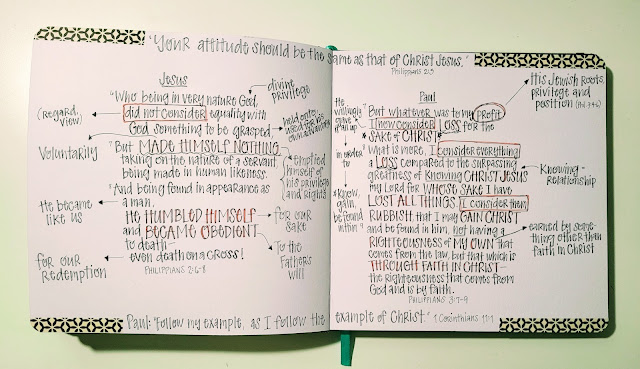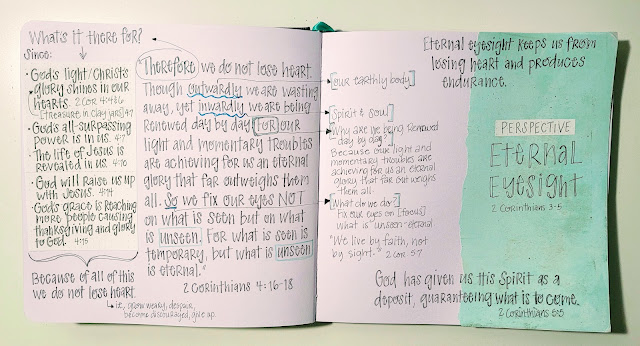Friday, February 25, 2022
Formed By the Word Week 7: Indicative
Friday, February 18, 2022
Formed By the Word Week 6: Imitate
Week 6: Imitate
The way of imitating Christ is to love and to sacrifice through service to others.
Friday, February 11, 2022
Formed by the Word Week 5: Attitude
Week 5: Attitude
"Your attitude should be the same as that of Christ Jesus:Who, being in very nature God,did not consider equality withGod something to be grasped,but made himself nothing,taking the very nature of a servant,being made in human likeness.And being found in appearance as a man,he humbled himselfand became obedient to death -even death on a cross!"
Jesus Christ was in his very nature, God. He had God's divine privilege and position and status. Yet, he did not consider - regard or view - his equality with God as something to be grasped - held onto, clung to selfishly, used for his own advantage - or, in American terms, he did not exert his right to his equality with God. The New Living Translation (NLT) translates verse 6 with this tone: "Though he was God, he did not demand and cling to his rights as God."
Instead, verse 7 tells us, he made himself nothing. The word "made" implies that this was a vouluntary action on Jesus' part. He voluntarily made himself nothing - in other words, he emptied himself of his privileges and rights and poured himself out. How? By "taking on the nature of a servant, being made in human likeness."
Friday, February 4, 2022
Formed By the Word: Week 4 ~ Perspective: Eternal Eyesight
Week 4 ~ Perspective: Eternal Eyesight
- Week One ~ Perspective: Behold Christ.
- Week Two ~ Perspective: Eyes Wide Open
- Week Three ~ Perspective: Godly Perception
- Week Four ~ Perspective: Eternal Eyesight
Eternal Eyesight
The last thing I noticed about having God’s perspective in chapters 3-5 of 2 Corinthians is that with His help we grow to see suffering and trials and the circumstances of life from His point of view. With our eyes focused on the “eternal glory” that far outweighs anything we experience in this life (4:17), we are able to “live [walk] by faith, not by sight” (5:7). We can recognize that the bodies we live in and the lives we live are simply God’s treasure in frail clay jars meant to reveal His glory and power (4:7). The trials and suffering, despair, and persecution, all help to build our faith in God and reveal the death and resurrection life of Jesus in us (4:8-11). These things enable others to see Jesus in us! God’s eternal perspective enables us to be renewed inwardly day by day, because in view of eternity they are “light and momentary”. “So, we fix our eyes not on what is seen [the trials, the suffering and despair, the circumstances of life] but on what is unseen [the eternal glory of God] since what is seen is temporary, but what is unseen is eternal” (4:16-18). Eternal eyesight keeps us from “losing heart”, from giving into doubt and fear, because we know Whose we are and what His purpose is for those who are in Christ. “We know that the one who raised the Lord Jesus from the dead will also raise us with Jesus and present us with you to Himself” (4:14). We have an eternal house in heaven (5:1) and “the one who has fashioned us for this very purpose is God, who has given us the Spirit as a deposit, guaranteeing what is to come” (5:5).
“So we make it our goal to please him, whether we are at
home in the body [in this present age] or away from it [in the age
to come – eternity]. For we must all appear before the judgment seat
of Christ, so that each of us may receive what is due us for the things done in
the body [in this present age], whether good or bad.” 2 Corinthians
5:9-10
Eternal eyesight keeps us from losing heart: it produces endurance.
"Therefore we do not lose heart. Though outwardly we are wasting away, yet inwardly we are being renewed day by day. For our light and momentary troubles are achieving for us an eternal glory that far outweighs them all. So we fix our eyes not on what is seen but on what is unseen. For what is seen is temporary, but what is unseen is eternal." 2 Corinthians 4:16-18
Finally, when we can see trials and suffering and the circumstances of life as God does, we will see these things as opportunities. God uses what we go through so that we, like Him, have compassion on others, and we, then, comfort them as we ourselves have received comfort from God. Most likely the comfort God gives came about through other people He used to bring us His comfort. God's purposes serve to enable us to praise Him and focus on and serve others. We reach back to the first chapter of 2 Corinthians to see this.
"Praise be to the God and Father of our Lord Jesus Christ, the Father of compassion and the God of all comfort, who comforts us in all our troubles, so that we can comfort those in any trouble with the comfort we ourselves receive from God. For just as we share abundantly in the sufferings of Christ, so also our comfort abounds through Christ. If we are distressed, it is for your comfort and salvation; if we are comforted, it is for your comfort, which produces in you patient endurance of the same sufferings we suffer. And our hope for you is firm, because we know that just as you share in our sufferings, so also you share in our comfort." 2 Corinthians 1:3-7
In being formed by the Word of God we gain God's perspective. We see Him clearly as we behold Christ through the Gospel. As we grow in Christlikeness our eyes are wide open to see ourselves as God's ministers, living godly lives. We gain Godly perception to see others, believers and unbelievers, as He does, through the lens of the Gospel. And we grow in the ability to see suffering, trials, and the curcumstances of life clearly with eternal eyesight.
Thank you for joining me as I have explored and dug into these perspective words in 2 Corinthians chapters 3-5.
* * * * *
I would love to have you to join me in being formed by the Word this year. After reading the above post, do some study on your own. Dig deeper into the verses and passages mentioned and then respond creatively. Share your thoughts and creative responses in the comment section below or on social media with #formedby theword and #wordsartandfaithgroup, and in our private Facebook group for words challenges the Words Art and Faith group.












